Human Flower Project
Conscientious Consumption
An online flower seller blends status-magic with the protestant ethic.
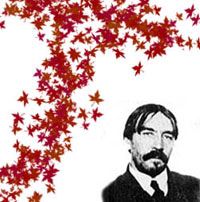 Thorstein Veblen
Thorstein Veblen
Image: l’Association des Amis de Thorstein Veblen
A hundred years ago Thorstein Veblen introduced the concept of “conspicuous consumption” in his remarkably up-to-date book The Theory of the Leisure Class.
“Unproductive consumption of goods is honourable,” Veblen wrote, “primarily as a mark of prowess and a perquisite of human dignity.” It has ever been the sign of “gentleness,” he contended, to disdain the necessities of life and surround oneself with extravagances, “choice articles of food, and frequently also of rare articles of adornment.” It’s not so much that caviar tastes better than canned tuna, but that eating little fish eggs says you’re too rich to be hungry. (This appeal to the status-seeker in us all is how expensive restaurants get away with serving stingy portions flecked with edible confetti and calling it an entrée.)
The social magic of conspicuous consumption has worked like a charm among the Tlingit people and in Pakistan but it’s always been a somewhat awkward sell for the descendents of big-buckle pilgrims here in the U.S. Since before Benjamin Franklin pinched his first penny, lavishness was suspect here in the land of corn and Camrys. The Protestant ethic honored thrift instead; opulence was considered wasteful, morally suspect and – perhaps most damnable – tacky (think Sharon Stone in “Casino”).
Beyond the ethics and psychology of it all, there were problems from a business standpoint: under mass market capitalism, a price-tag with too many 0’s simply turned off too many buyers.
So U.S. retailers have a trick to pull off; they must juggle commodity magic (“conspicuous consumption”) with morality (what we call “conscientious consumption”). They’ve got to find some way to attach precious juju to what they’re selling without making the product so “dear” that a buckle-bearing customer won’t spring for it.
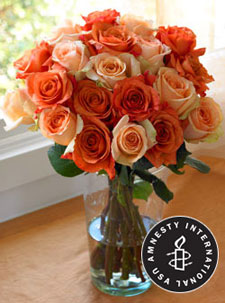 Amnesty International rose bouquet
Amnesty International rose bouquet
Photo: Organic Bouquet
Ta-da! Enter Gerald Prolman.
Prolman is the founder of Organic Bouquet, selling flowers online that have been certified organic from soil preparation to packaging. After just four years in business, the Marin County, California, company is “on track to ring up $3.5 million in sales this year.” And we can see why.
Prolman is attempting an intriguing experiment in the sociology of retailing – one aimed at conflicted US consumers. Organicbouquet.com hopes to turn the purchase of a luxury product – cut flowers—into a gesture of charity.
Wealth and philanthropy are old and convenient companions: the Carnegie family’s libraries, the Rockefeller zillions bestowed on New York’s art museums, or more recently, the Bill and Melinda Gates foundation, fighting AIDS in Africa. Societies expect largesse of their fattest cats, and fat cats usually comply (lest revolution cross someone’s mind). But Organic Bouquet would make Carnegies of us all, by burnishing a simple luxury item with moral brightness.
In the puritanical U.S., flowers have for three centuries been associated with foolish extravagance. How do you make a peony righteous? Prolman is trying to do just that. With experience marketing organic meats and vegetables, he saw a niche in horticulture and jumped in. “The industry is ready for a change. We’re the spark that’s changing it,” he said. “I believe Organic Bouquet is a $100 million opportunity within the next five years. And I believe, within the same time … you won’t be able to sell a flower in America unless it’s been deemed sustainable.”
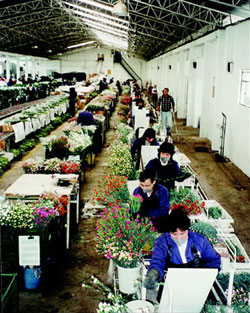 Processing non-organic flowers in Colombia
Processing non-organic flowers in Colombia
Photo: Jorge Tolosa, via Environmental Health Perspectives
We’ve written here before about the vile conditions for flower workers in many parts of the world. Kakaire A. Kirunda’s recent story, based on this FAO report, describes the exploitation of flower workers in Uganda. There, Kirunda writes, “Over 40 percent of the workforce suffer precarious employment and poor working conditions and live in poverty.”
Herbicides and pesticides are poisoning people in the flower industries of many Latin American and African countries. Around the world, workers, mostly women, are underpaid, sexually harassed, and threatened if they try to organize.
By calling attention to the realities of flower production and insisting on healthy, high standards, Prolman is shouting deservedly for every sale, in the name of human dignity and global ecology. He’s also wise to be capitalizing on this American paradox – the desire for distinction through “conspicuous consumption” and the desire for rectitude (pounding in the hearts of all those string-saving granddaughters of Ben Franklin).
We resist mentioning specific businesses at the Human Flower Project, especially ethernet flower sellers, because with our wallet, pounding heart and an e-megaphone, we support local florists. But Organicbouquet.com finally wore us down. This week, Prolman’s company became irresistible, even to a die-hard flower-shop fan like ourselves. Organicbouquet.com announced that, on some of its products, the company will share proceeds with Amnesty International.
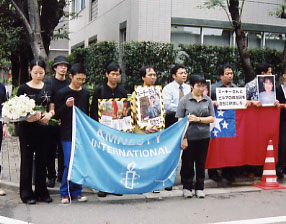 Members of Amnesty International Japan deliver a petition—and flowers— to the Myanmar Embassy in Tokyo, calling for immediate release of political prisoners, including Daw Aung San Suu Kyi
Members of Amnesty International Japan deliver a petition—and flowers— to the Myanmar Embassy in Tokyo, calling for immediate release of political prisoners, including Daw Aung San Suu Kyi
Photo: Amnesty International News
Amnesty International works for human rights across the globe. It has taken up the causes of hundreds of jailed dissidents, spoken out against torture, and is now protecting the right of Saddam Hussein (yes, he’s human, too) to a fair trial.
“Organic Bouquet will donate 10% of each purchase made at http://www.organicBouquet.com/amnestyusa (to Amnesty International). In addition, Organic Bouquet will donate 5% from sales of their new Amnesty International Bouquet two dozen certified organic roses – created especially to support the work of Amnesty International and available in the Charitable Bouquet collection of http://www.OrganicBouquet.com.” Mind you, that first address doubles the Amnesty International contribution,though apparently the cost of the flowers is the same.
 There is nothing like watching a florist make a corsage before your eyes, delivering that gift yourself and seeing a loved one’s chin glow from the light of an upturned blossom. To be invited into the big cooler at a flower shop and actually choose among fresh snapdragons, roses, dahlias and – on rarer occasions – sweet peas, is one of the true pleasures of life.
There is nothing like watching a florist make a corsage before your eyes, delivering that gift yourself and seeing a loved one’s chin glow from the light of an upturned blossom. To be invited into the big cooler at a flower shop and actually choose among fresh snapdragons, roses, dahlias and – on rarer occasions – sweet peas, is one of the true pleasures of life.
But by adding Amnesty International to its group of partners, (CARE, the Humane Society, and others benefit from the company’s flower sales too), Gerald Prolman has won us over. We’ll never give up shopping at local florists, but now we want to buy Organic Bouquets, too. There’s a Puritan in us after all.
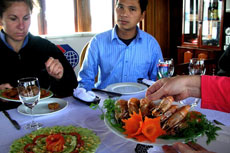

A vast majority of cut flowers sold in the United States, 79 percent, are imported. But only a small minority of flower farms have adopted environmentally friendly methods, such as banning toxic chemicals for pest control.And few of those farms bother with occupational health and safety measures for workers, who can suffer such pesticide-related illnesses as headaches, rashes and birth abnormalities among their children.